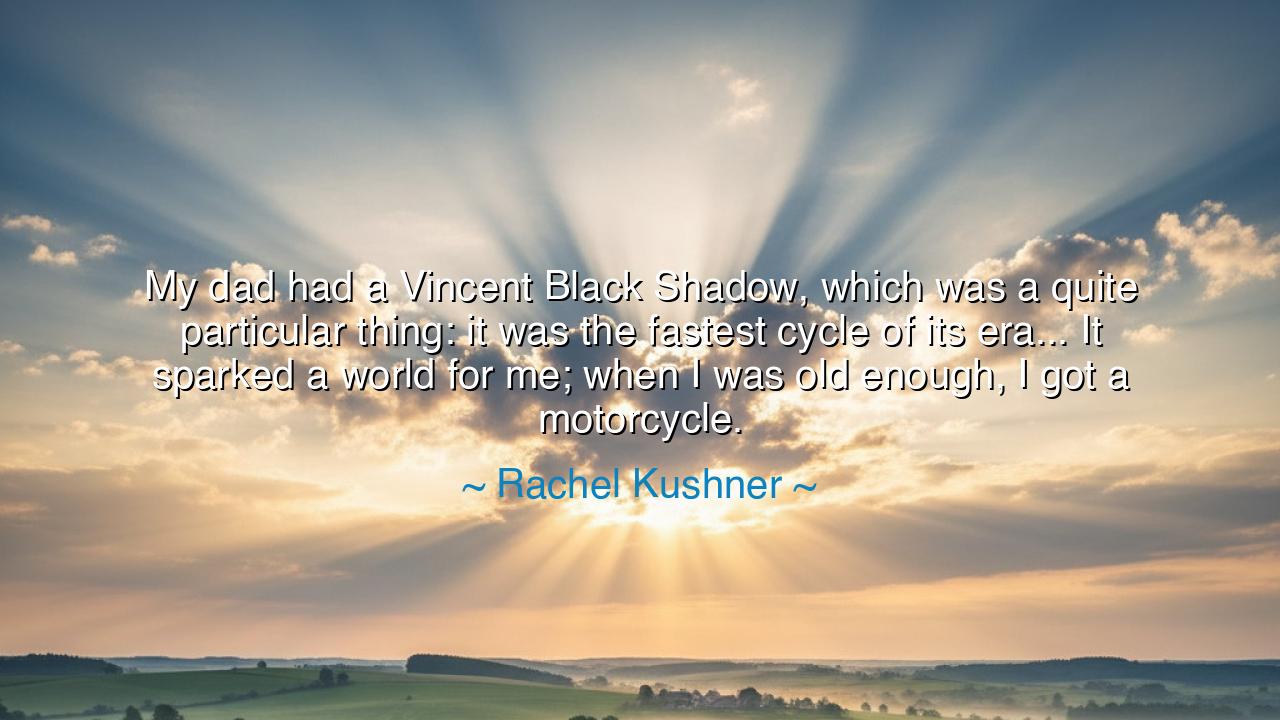
My dad had a Vincent Black Shadow, which was a quite particular
My dad had a Vincent Black Shadow, which was a quite particular thing: it was the fastest cycle of its era... It sparked a world for me; when I was old enough, I got a motorcycle.






In the realm where memory and motion intertwine, Rachel Kushner once spoke of her father and his machine, saying: “My dad had a Vincent Black Shadow, which was a quite particular thing: it was the fastest cycle of its era... It sparked a world for me; when I was old enough, I got a motorcycle.” These words, though simple, carry the echo of something far greater than a story about speed. They speak to inheritance — not of wealth or property, but of spirit — the unseen flame passed from one generation to the next. In that gleaming motorcycle, in the hum of its engine, Kushner saw not just a machine, but a symbol: of freedom, of power, and of the human desire to move beyond boundaries.
The Vincent Black Shadow, born in the 1940s, was no ordinary motorcycle. It was a marvel of its age — the swiftest of its kind, a dark thunderbolt of engineering and rebellion. To own one was to possess not merely a vehicle, but a declaration of will. For Kushner’s father, that machine was an emblem of daring and independence; for his daughter, it became a beacon of imagination. The way he rode, the sound it made, the mystery it carried — all of it ignited in her a lifelong fascination with velocity and risk, with the poetry of motion. Through the sight of her father’s motorcycle, she glimpsed a world where identity could be shaped not by circumstance, but by courage.
From the earliest civilizations, the bond between generations has been the thread by which knowledge and passion endure. The father builds, and the child dreams; the child watches, and in that watching, learns not what to do, but how to be. Just as the blacksmith’s son once watched the glowing forge and felt in his bones the call of the flame, so did Kushner, watching her father’s Vincent, feel the call of movement. His machine became her myth, her symbol of possibility. What he loved, she learned to love. What he dared, she dared. This is how human culture survives — not by instruction alone, but by inspiration.
Consider the tale of Amelia Earhart, who, as a young girl, watched airplanes soar above her hometown and felt something awaken inside her. Those fragile biplanes were the “Vincent Black Shadows” of her day — icons of speed and transcendence. They called her beyond the ordinary life expected of her, and she answered. So too with Kushner: the sight of her father’s motorcycle planted a seed of daring that would one day bloom into her own pursuit of motion, art, and danger. In her novels and essays, the motorcycle remains a symbol not of escape, but of self-possession — the power to steer one’s own path through a world of limits.
The origin of Kushner’s quote lies in remembrance, but its meaning reaches into the universal. It reminds us that inspiration often hides in the everyday — in a parent’s passion, in a sound, a sight, a story told at dusk. The spark that lit her imagination was not forced upon her; it was offered freely, through the example of a life lived vividly. And this is the quiet truth of inheritance: that the most lasting gifts are not spoken but witnessed, not taught but felt. What her father gave her was not a motorcycle, but the courage to desire one — to chase the feeling of life at full speed.
Yet this tale also carries a deeper lesson. The motorcycle, for all its power, is a dangerous thing; to ride it is to make peace with mortality. In embracing her father’s passion, Kushner also embraced risk — the understanding that freedom and danger are intertwined. The ancients would have called this the wisdom of balance: the knowledge that every great joy requires vulnerability, that every act of creation carries the shadow of destruction. To live fully is to ride the edge — not recklessly, but with reverence for the forces one commands.
So, my children of the future, hear the wisdom within these words: cherish the sparks that your elders leave behind, for they are torches in the dark. When you see someone live with fire — whether it is your parent, a teacher, or a stranger — do not merely admire them; learn from them. Let their passions awaken your own. And when the time comes, pass your own flame onward, for that is how meaning survives across time.
For as Rachel Kushner reminds us, the world is full of engines waiting to be awakened — not just machines, but hearts, ideas, dreams. Ride yours boldly. Fear not the speed of life, nor the depths of its risk. For to live truly, as she and her father did, is to take hold of the throttle of existence, to listen to the hum of destiny beneath you, and to race forward — not away from life, but toward the horizon of all it can be.






AAdministratorAdministrator
Welcome, honored guests. Please leave a comment, we will respond soon